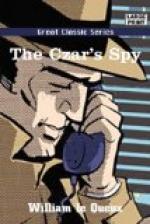A wound from a misericordia always proves fatal, because the shape of the blade cuts the flesh into little flaps which, on withdrawing the knife, close up and prevent the blood from issuing forth. At the same time, however, no power can make them heal again. A blow from such a weapon is as surely fatal as the poisoned poignard of the Borgia or the Medici.
I handed the stiletto back to the man without comment. My resolve was to say as little as possible, for I had no desire to figure publicly at the inquiry, and consequently negative all my own efforts to solve the mystery of the Leithcourts and of Martin Woodroffe.
I returned to where the figure was lying so ghastly and motionless, and looked again for the last time upon the dead face of the man who had served me so well, and yet who had enticed me so nearly to my death. In the latter incident there was a deep mystery. He had relented at the last moment, just in time to save me from my secret enemies.
Could it be that my enemies were his? Had he fallen a victim by the same hand that had attempted so ingeniously to kill me?
Why had Leithcourt gone so regularly up to Rannoch Wood? Was it in order to meet the man who was to be entrapped and killed? What was Olinto Santini doing so far from London, if he had not come expressly to meet someone in secret?
As I glanced down at the cold, inanimate countenance upon which mystery was written, I became seized by regret. He had been a faithful and honest servant, and even though he had enticed me to that fatal house in Lambeth, yet I recollected his words, how he had done so under compulsion. I remembered, too, how he had implored me not to prejudge him before I became aware of the full facts.
With my own hand I re-covered the face with the sheet, and inwardly resolved to avenge the dastardly crime.
I regretted that I was compelled to reveal the dead man’s name to the police, yet I saw that to make some statement was now inevitable, and therefore I accompanied the constable to the inspector’s office some distance across the town.
Having been introduced to the big, fair-haired man in a rough tweed suit, who was apparently directing the inquiries into the affair, he took me eagerly into a small back room and began to question me. I was, however, wary not to commit myself to anything further than the identification of the body.
“The fact is,” I said confidentially, “you must omit me from the witnesses at the inquest.”
“Why?” asked the detective suspiciously.
“Because if it were known that I have identified him, all chance of getting at the truth will at once vanish,” I answered. “I have come here to tell you in strictest confidence who the poor fellow really is.”
“Then you know something of the affair?” he said, with a strong Highland accent.
“I know nothing,” I declared. “Nothing except his name.”




